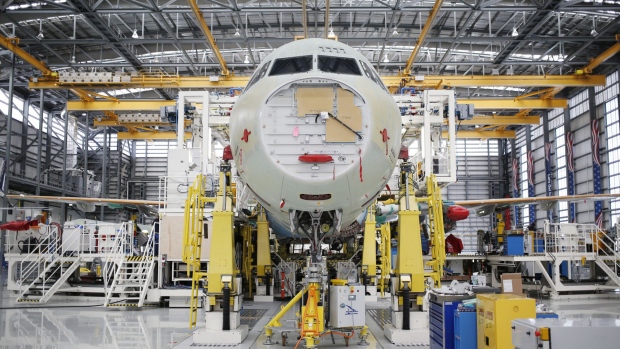Sep 25, 2019
Airbus Trade Feud Spurs New Trump Risk for Boeing, Airlines
, Bloomberg News

(Bloomberg) -- U.S. tariffs on European airplanes and luxury goods are emerging as a new threat not just for Airbus SE but for U.S. airlines. The risk is rising for Boeing Co. as well if the European Union seeks to retaliate.
The World Trade Organization will authorize the U.S. to impose tariffs on nearly $8 billion of European goods due to illegal state aid provided to Airbus, Bloomberg News reported Wednesday. The U.S. duties, which could hit as soon as October, will target planes and aircraft parts as well as luxury products such as wine and leather goods, according to the U.S. Trade Representative’s office.
The WTO decision marks an escalation in a long-running dispute that the U.S. and EU have waged over aircraft-manufacturing subsidies, and will further test trans-Atlantic relations that are already under stress from President Donald Trump’s “America First” strategy. The deterioration endangers the cross-border ties that Boeing, Airbus and global airlines rely on.
“I’m a little concerned because this certainly fits the Trump administration’s aggressive approach to trade,” said Richard Aboulafia, aerospace analyst with Teal Group. “Not crossing borders isn’t an option in this industry. Exports aren’t gravy in this business -- they’re absolutely the lifeline.”
Wine, Handbags
The WTO award is lower than the Trump administration’s request to impose tariffs on as much as $11.2 billion worth of European exports stemming from the nearly 15-year-old dispute.
The U.S. hasn’t finalized which goods it will hit, but the preliminary list also includes whiskey, motorcycles, leather handbags, cheese and wine. The duties may also hit products made by Europe’s producers of luxury brands -- like LVMH Moet Hennessy Louis Vuitton SE, Christian Dior SE and Hermes International.
In the airline industry, U.S. carriers are pushing back.
“It is unprecedented for the government to impose tariffs on aircraft,” said Airlines for America, a trade group. “It’s widely believed that new tariffs on aircraft would negatively impact the U.S. commercial aviation industry as well as the overall economy.”
An Airbus factory in Mobile, Alabama, depends on imported parts to build the company’s top-selling A320 family jets, which are also made in Europe and China. The European planemaker plans to expand the U.S. site to build the smaller A220 as orders increase from U.S. carriers including JetBlue Airways Corp. and Delta Air Lines Inc.
‘Serious Harm’
“Imposing tariffs on aircraft that U.S. companies have already committed to would inflict serious harm on U.S. airlines, the millions of Americans they employ and the U.S. traveling public,” Delta spokeswoman Lisa Hanna said in a statement.
In a statement, Airbus said it doesn’t comment on “rumors on a report that is not public.” But the company said: “A tariffs battle is a no-win situation for the entire global aviation industry. Airbus continues to favor a negotiated solution to resolve this complex trade dispute.”
Boeing declined to comment.
In a separate WTO case, the EU claimed that Boeing benefited from illegal subsidies, including from the state of Washington. That case is likely to conclude in the next six to nine months, according to Bank of America Corp.
Before that, the U.S. may seek to “apply maximum pressure” while “targeting a settlement before the EU could legally apply tariffs to Boeing,” Bank of America analyst Benjamin Heelan said in a report this week.
Boeing, meanwhile, has a complicated agenda in Europe. The European Commission is conducting an antitrust review of the company’s proposed commercial-jet venture with Brazil’s Embraer SA. European regulators are also conducting an independent safety assessment of Boeing’s 737 Max, which has been grounded more than six months.
“The certification process has become increasingly political,” Bernstein analyst Douglas Harned said in a report earlier this month on the WTO sanctions. “This type of action would likely make it worse.”
(Updates with response from Airbus in the 11th paragraph)
--With assistance from Julie Johnsson.
To contact the reporter on this story: Justin Bachman in Dallas at jbachman2@bloomberg.net
To contact the editors responsible for this story: Brendan Case at bcase4@bloomberg.net, Susan Warren
©2019 Bloomberg L.P.